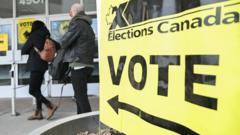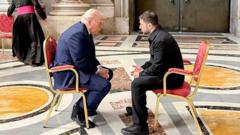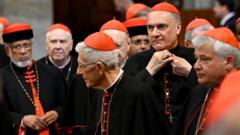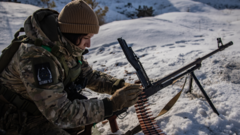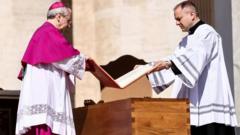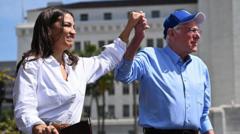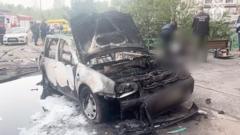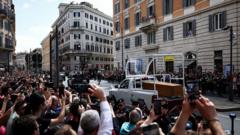In a recent encounter at Pope Francis's funeral, former President Donald Trump aired doubts regarding Russian President Vladimir Putin's commitment to peace in Ukraine, sparking a renewed discussion on diplomatic efforts and tensions in the region.
**Trump Casts Doubt on Putin's Intentions for Peace Post-Zelensky Meeting at Vatican**

**Trump Casts Doubt on Putin's Intentions for Peace Post-Zelensky Meeting at Vatican**
Following a meeting between Donald Trump and Volodymyr Zelensky in Vatican City, Trump expresses skepticism about Putin's desire for peace in Ukraine.
Trump's remarks came shortly after his brief yet impactful meeting with Ukraine's leader, Volodymyr Zelensky, during an event filled with high-profile attendees and a backdrop of somber reflection.
After attending Pope Francis's funeral, Donald Trump took to social media to express skepticism about Russian President Vladimir Putin's intentions concerning the ongoing war in Ukraine. Speaking about his recent meeting with Ukrainian President Volodymyr Zelensky on the sidelines of the event, Trump indicated that he was not convinced of Putin's desire to reach a resolution.
He specifically referred to recent missile strikes by Moscow on civilian areas in Kyiv, suggesting that they hinted at Putin's true intentions. In a post on Truth Social, Trump phrased his concerns: “Makes me think that maybe he doesn't want to stop the war; he's just tapping me along, and has to be dealt with differently.”
The 15-minute meeting between Trump and Zelensky was characterized as "very productive" by the White House, with Zelensky describing it as having potentially historic implications. This was their first in-person meeting since a contentious exchange in February and included moments of intense conversation captured in photographs shared by both parties' delegations.
During this meeting, Trump reiterated sentiments he's voiced in the past—that Zelensky had “no cards to play” in negotiations against Russia. He has previously implicated Ukraine in initiating the conflict while placing significant pressure on Zelensky to consider territorial concessions for peace.
The Kremlin has signaled its own openness to negotiations, with Putin expressing a willingness to engage without preconditions. However, Trump's stance appears to have shifted recently, as he initially noted a potential for a deal following his envoy's talks with the Russian leader earlier this week.
Responses from global leaders also underscored the gravity of the situation. Following the meeting, British Prime Minister Sir Keir Starmer and French President Emmanuel Macron conveyed their commitment to working toward a peaceful resolution with Ukraine. Macron remarked that ending the war was a shared objective.
Despite discussions about future dialogues, Trump's quick exit from Rome post-meeting and Zelensky's subsequent engagements with European leaders called into question the potential for immediate follow-ups. The interplay of pressures on Ukraine, particularly regarding territorial concessions, continues to be a major point of contention as the leaders navigate this complex geopolitical landscape.
The backdrop of Pope Francis's funeral lent a poignant weight to the meetings, with Cardinal Giovanni Battista Re calling for peace during his address, echoing the sentiments of building rather than dividing. The unfolding events underscore the intricacies of international diplomacy amid ongoing conflicts and the critical need for substantial progress toward peace in Ukraine.
After attending Pope Francis's funeral, Donald Trump took to social media to express skepticism about Russian President Vladimir Putin's intentions concerning the ongoing war in Ukraine. Speaking about his recent meeting with Ukrainian President Volodymyr Zelensky on the sidelines of the event, Trump indicated that he was not convinced of Putin's desire to reach a resolution.
He specifically referred to recent missile strikes by Moscow on civilian areas in Kyiv, suggesting that they hinted at Putin's true intentions. In a post on Truth Social, Trump phrased his concerns: “Makes me think that maybe he doesn't want to stop the war; he's just tapping me along, and has to be dealt with differently.”
The 15-minute meeting between Trump and Zelensky was characterized as "very productive" by the White House, with Zelensky describing it as having potentially historic implications. This was their first in-person meeting since a contentious exchange in February and included moments of intense conversation captured in photographs shared by both parties' delegations.
During this meeting, Trump reiterated sentiments he's voiced in the past—that Zelensky had “no cards to play” in negotiations against Russia. He has previously implicated Ukraine in initiating the conflict while placing significant pressure on Zelensky to consider territorial concessions for peace.
The Kremlin has signaled its own openness to negotiations, with Putin expressing a willingness to engage without preconditions. However, Trump's stance appears to have shifted recently, as he initially noted a potential for a deal following his envoy's talks with the Russian leader earlier this week.
Responses from global leaders also underscored the gravity of the situation. Following the meeting, British Prime Minister Sir Keir Starmer and French President Emmanuel Macron conveyed their commitment to working toward a peaceful resolution with Ukraine. Macron remarked that ending the war was a shared objective.
Despite discussions about future dialogues, Trump's quick exit from Rome post-meeting and Zelensky's subsequent engagements with European leaders called into question the potential for immediate follow-ups. The interplay of pressures on Ukraine, particularly regarding territorial concessions, continues to be a major point of contention as the leaders navigate this complex geopolitical landscape.
The backdrop of Pope Francis's funeral lent a poignant weight to the meetings, with Cardinal Giovanni Battista Re calling for peace during his address, echoing the sentiments of building rather than dividing. The unfolding events underscore the intricacies of international diplomacy amid ongoing conflicts and the critical need for substantial progress toward peace in Ukraine.


